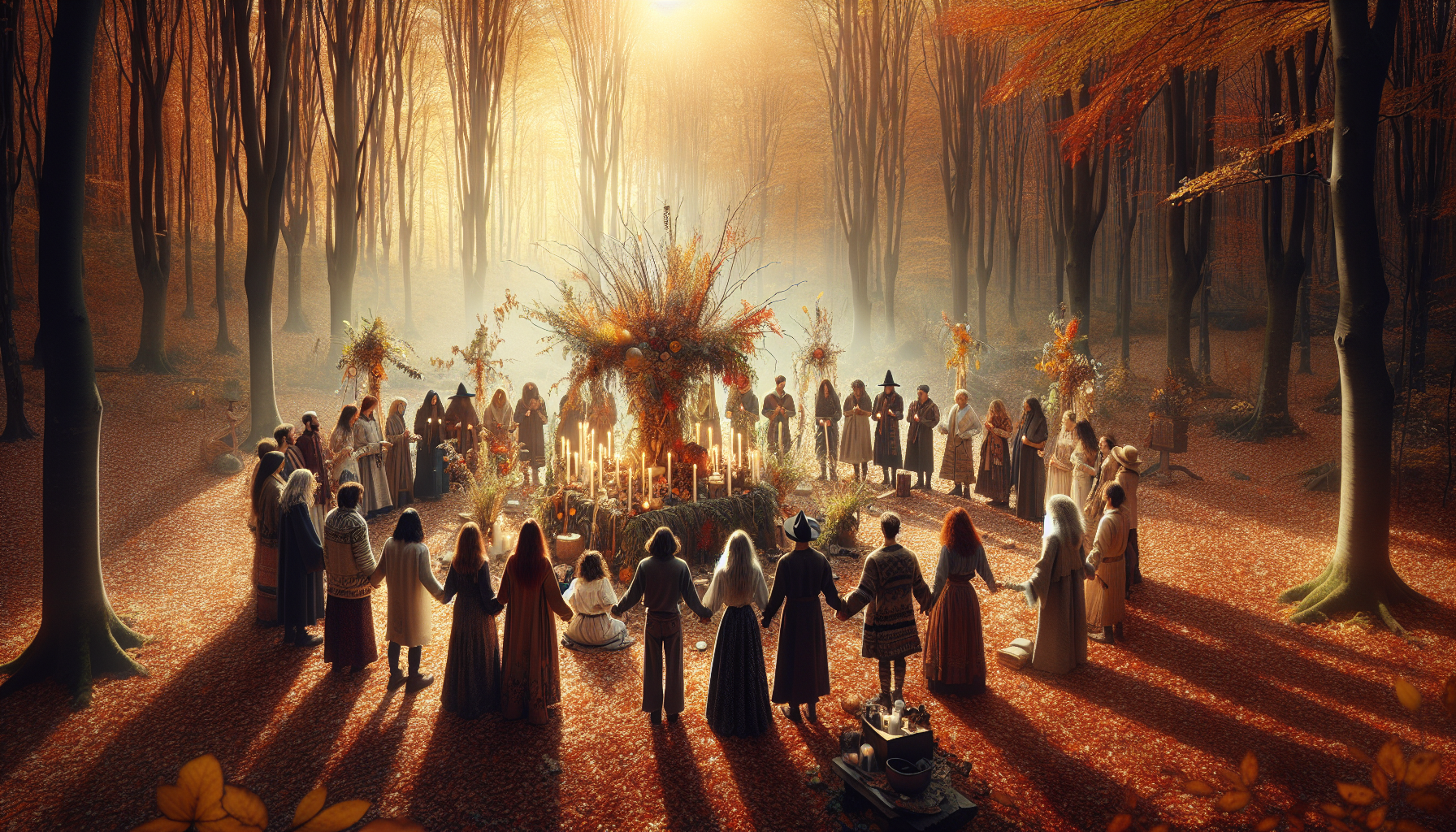In the intricate tapestry of nature, there exists a symphony that often goes unnoticed by the casual observer. This symphony, however, holds the whispers of time itself, echoing through the rustling leaves and the whispering winds. It is the song of birds, a harmonious blend of notes that not only enlivens our surroundings but also serves as a mysterious key to unlocking the secrets of the future. Throughout history, cultures around the world have turned their ears to the avian orchestra, believing that within these melodic calls lies the power to foresee events yet to unfold. This belief, deeply rooted in tradition and lore, forms the fascinating intersection of ornithology and prophecy—a realm where the calls of birds become “The Song of Destiny.”
For centuries, humans have looked to nature for guidance and signs, and the calls of birds have been one of the most intriguing elements in this quest for understanding. From the mystical forests of ancient Europe to the sacred lands of indigenous tribes, bird calls have been regarded as omens and messages from the divine. These sounds, often perceived as mere background noise, are in fact a language—one that, if interpreted correctly, can reveal insights into the future. Imagine walking through a dense forest, the air thick with anticipation, as the call of a raven pierces through the silence, sending a shiver down your spine. Is it a warning, a blessing, or perhaps a prediction of what is to come?
The concept of using bird calls as a tool for prophecy is as diverse as the birds themselves. In our journey through this article, we will explore various cultural interpretations of bird calls as omens and their roles in predicting events. From the augurs of ancient Rome, who meticulously studied the flight patterns and songs of birds to divine the will of the gods, to the shamans of indigenous cultures who perceive these calls as direct communications with the spirit world, the belief in avian prophecy is both widespread and deeply embedded in human history. Furthermore, we will delve into contemporary interpretations and the scientific inquiries that seek to understand the potential cognitive and intuitive connections between humans and these feathered seers.
As we navigate through this exploration, we will encounter compelling stories and testimonies that illustrate the profound impact bird calls have had on decision-making processes across different societies. We will examine how leaders and common folk alike have relied on these natural cues to guide them through pivotal moments, from embarking on new journeys to making critical choices in times of uncertainty. This article will also address the skepticism that surrounds this practice, contrasting it with the unwavering belief of those who trust in the prophetic power of birds. By weaving together ancient traditions with modern perspectives, we aim to present a holistic view of this enigmatic practice.
Join us on this captivating journey as we unravel the threads of history, culture, and science that bind humans to birds in this unique form of prophecy. “The Song of Destiny: How Bird Calls are Used in Prophecy to Predict the Future” is not just a tale of ancient superstitions, but a reflection on the enduring human desire to connect with the natural world and find meaning in its myriad voices. Whether you are a skeptic or a believer, an ornithologist or a curious reader, this exploration promises to enrich your understanding of the mysterious relationship between mankind and the avian world. Let the calls of the birds guide us into the unknown, revealing the symphony of life that foretells our shared destiny. 🐦✨
The Mysterious Connection Between Birds and Prophecy
Birds have fascinated humans for millennia, not only for their ability to soar the skies but also for their mysterious songs that seem to carry messages from another realm. In many cultures around the world, birds are seen as harbingers of change, messengers of the divine, and even predictors of the future. This ancient belief has woven itself into the fabric of human storytelling, mythology, and prophecy. The study of bird calls in prophecy, often referred to as ornithomancy, examines how different cultures have interpreted these avian sounds as messages of destiny. Understanding these beliefs requires a deep dive into history, anthropology, and even psychology, revealing a rich tapestry of human imagination and intuition.
In ancient Rome, augurs interpreted the will of the gods by studying the flight patterns and calls of birds. This practice, known as ‘taking the auspices,’ was central to decision-making, especially in matters of war and politics. Similarly, in ancient Greece, bird calls were seen as omens, often consulted before embarking on significant endeavors. Native American tribes have long held beliefs that bird songs carry the spirits’ messages, guiding the tribe through life’s challenges and celebrations. These traditions highlight a universal human inclination to seek patterns and meaning in the natural world, a testament to our inherent desire to understand the unknown.
Bird calls have a unique ability to evoke emotional responses and inspire creativity. This phenomenon is deeply rooted in the human psyche, as the auditory cues provided by birds are often associated with changes in the environment, signaling seasonal transitions and altering human activities. The musicality of bird songs can influence human emotions, inspiring poets, musicians, and prophets alike. In modern times, scientists have explored the psychological impact of bird songs, finding that these sounds can reduce stress and enhance well-being, a fascinating intersection of nature and human psychology. As you explore the world of bird calls and prophecy, consider how these ancient beliefs continue to resonate in today’s society, bridging the gap between the past and the future.
How Different Cultures Interpret Bird Calls
The interpretation of bird calls varies widely across different cultures, each with its own unique perspective on the messages conveyed by these avian sounds. In Celtic folklore, the call of the raven is often associated with prophecy and insight, as the bird is linked to the goddess Morrigan, who presides over fate and warfare. In contrast, the call of the cuckoo heralds the arrival of spring and is considered a positive omen, symbolizing growth and renewal. These interpretations reflect the cultural values and beliefs of the Celtic people, who saw the natural world as a living tapestry of signs and symbols.
In Japan, the cry of the uguisu, or Japanese bush warbler, is celebrated in literature and poetry as a harbinger of spring, symbolizing hope and new beginnings. Its melodious song is often described as a gentle reminder of the transient beauty of life, a theme that resonates deeply with the Japanese aesthetic of wabi-sabi, which finds beauty in imperfection and impermanence. This cultural interpretation highlights the profound connection between humans and nature, emphasizing the role of bird calls in shaping cultural identity and artistic expression.
In the Yoruba culture of West Africa, birds are considered intermediaries between the physical and spiritual realms. The call of the owl, for instance, is believed to be a message from the ancestors, guiding the living through life’s trials. This belief underscores the spiritual significance of bird calls, which serve as a bridge between the seen and unseen worlds. As you explore the diverse interpretations of bird calls across cultures, you’ll uncover a rich tapestry of beliefs that reflect the human quest for meaning and connection with the natural world.
Comparative Table of Bird Calls in Different Cultures
| Culture | Bird | Interpretation |
|---|---|---|
| Ancient Rome | Eagle | Symbol of victory and divine favor |
| Ancient Greece | Owl | Sign of wisdom and protection |
| Celtic | Raven | Omen of prophecy and insight |
| Japanese | Uguisu | Harbinger of spring and new beginnings |
| Yoruba | Owl | Message from the ancestors |
As you can see from the table above, bird calls have been interpreted in myriad ways, each providing a glimpse into the cultural psyche and values of different societies. This diversity highlights the universal human fascination with birds and their songs, offering a lens through which we can better understand our shared humanity.
Modern Applications of Bird Call Prophecies
In contemporary times, the ancient art of interpreting bird calls has evolved, blending traditional beliefs with modern scientific understanding. Today, ornithologists and bird enthusiasts study bird calls not only for their prophetic implications but also for their ecological significance. Bird songs provide valuable insights into environmental changes, serving as indicators of biodiversity and ecosystem health. This intersection of ancient wisdom and modern science offers a holistic approach to understanding the natural world, emphasizing the importance of preserving both cultural heritage and environmental integrity.
The use of technology has revolutionized the study of bird calls, enabling researchers to record and analyze avian sounds with unprecedented precision. This technological advancement has led to the development of sophisticated algorithms that can identify bird species based on their calls, providing valuable data for conservation efforts. These tools have also allowed scientists to explore the cognitive and communicative abilities of birds, shedding light on the complexity and diversity of avian communication. As we delve deeper into the study of bird calls, we continue to unravel the mysteries of these enigmatic creatures, bridging the gap between ancient prophecy and modern science.
Furthermore, the cultural significance of bird calls remains relevant in contemporary society, inspiring artists, musicians, and storytellers to explore themes of destiny, transformation, and the interconnectedness of life. This enduring fascination with bird calls reflects a timeless human desire to seek meaning and connection with the natural world. As you engage with the modern applications of bird call prophecies, consider how these ancient beliefs continue to shape our understanding of the world and our place within it.
Watch and Learn: Bird Calls and Their Meanings
For a deeper understanding of bird calls and their meanings, watch the video below, which explores the significance of bird songs across different cultures and their impact on human perception:
The Secret Language of Birds – TEDx Talks
This video provides a fascinating insight into the world of bird calls, offering a unique perspective on how these avian sounds have influenced human culture and understanding. Whether you’re a bird enthusiast or simply curious about the mysteries of nature, this video is sure to captivate and inspire.
Bird Calls as a Tool for Personal Reflection and Growth
Beyond their prophetic and ecological significance, bird calls offer a powerful tool for personal reflection and growth. By tuning into the natural rhythms and sounds of the avian world, individuals can cultivate mindfulness and deepen their connection with nature. This practice, often referred to as ‘birding meditation,’ involves listening to bird calls as a form of meditation, allowing the mind to settle and focus on the present moment. This mindful engagement with bird calls can enhance emotional well-being, promote relaxation, and foster a greater appreciation for the natural world.
In addition to mindfulness practices, bird calls can also serve as a source of inspiration and creativity. Many artists and writers draw upon the symbolism and beauty of bird songs in their work, exploring themes of freedom, transformation, and renewal. This creative exploration can lead to personal insights and growth, as individuals reflect on their own life journeys and aspirations. By engaging with bird calls in this way, individuals can tap into the rich symbolism and meaning inherent in the natural world, unlocking new perspectives and possibilities.
Whether used as a tool for meditation or creative expression, bird calls offer a gateway to personal transformation and self-discovery. As you explore the potential of bird calls for personal reflection and growth, consider how these avian sounds can inspire and guide you on your own path of exploration and discovery.
Reflective Exercise: Listening to Bird Calls
To engage with bird calls as a tool for personal reflection, try the following exercise:
- Find a quiet outdoor space where you can sit comfortably and undisturbed.
- Close your eyes and take a few deep breaths, allowing your mind to settle.
- Focus your attention on the sounds around you, particularly the calls of birds.
- Notice the different qualities of each bird call, such as pitch, rhythm, and tone.
- Reflect on the emotions and thoughts that arise as you listen to these avian sounds.
- Consider how the bird calls relate to your current life experiences and challenges.
This exercise can be a powerful tool for cultivating mindfulness and gaining insights into your own life, offering a unique opportunity to connect with the natural world and your inner self.

Conclusion
The exploration of how bird calls are utilized in prophecy to predict the future, as presented in “The Song of Destiny: How Bird Calls are Used in Prophecy to Predict the Future,” offers a fascinating intersection of ornithology, mythology, and cultural anthropology. Throughout the article, we delved into the rich tapestry of historical traditions, scientific insights, and cultural narratives that underscore the significance of avian vocalizations in the realm of prophecy.
We began by examining the historical context, tracing the roots of bird call divination back to ancient civilizations such as Greece and Rome. These societies held birds in high regard, attributing divine messages to their songs and behaviors. The practice of augury, for instance, involved interpreting the will of the gods through the observation of birds. Such historical accounts provide us with a glimpse into the profound influence that avian communication has wielded over human belief systems and decision-making processes.
Transitioning from historical to modern perspectives, we explored the scientific research that lends credibility to the idea that birds possess a heightened sensitivity to environmental changes. Studies have shown that birds can detect subtle shifts in weather patterns, electromagnetic fields, and even seismic activities, sometimes before humans are aware of them. This scientific grounding challenges us to reconsider the possible validity of bird calls as harbingers of future events.
Cultural narratives from various indigenous communities around the world further enrich our understanding of this phenomenon. Many tribes interpret bird songs as omens or signals from the spiritual world, guiding them in making critical life decisions. These traditions not only preserve cultural heritage but also foster a deeper connection with nature, encouraging us to listen more intently to the world around us.
In recognizing the importance of this topic, we acknowledge the vital role that birds play in ecosystems as indicators of environmental health. Their songs can alert us to changes in biodiversity and habitat conditions, serving as natural barometers of ecological balance. This awareness underscores the need for conservation efforts to protect avian populations and their habitats, ensuring that these ancient messengers continue to enrich our lives with their melodies.
As we conclude, it is essential to reflect on the broader implications of the themes discussed. The intersection of bird calls and prophecy invites us to embrace a more holistic understanding of the natural world, one that values the wisdom inherent in non-human forms of communication. By doing so, we open ourselves to the possibility of living in greater harmony with nature, guided by the subtle cues it offers.
We encourage you, dear reader, to share your thoughts on this intriguing subject. Whether through personal experiences, cultural insights, or scientific interests, your perspective adds depth to this ongoing dialogue. Engage with us in the comments section, share this article with others who might find it enlightening, or apply these insights to your own explorations of the natural world.
As we navigate an increasingly complex and unpredictable world, let us remain inspired by the timeless wisdom of the avian realm. Their songs, both ancient and new, continue to echo across cultures and epochs, reminding us of the interconnectedness of all life. May we listen, learn, and look to the skies with renewed wonder and curiosity. 🌿🕊️
For further reading, explore Audubon Society’s insights on bird behavior and conservation efforts, or delve into Scientific American’s coverage of how birds adapt to environmental changes. These resources provide additional layers of understanding and appreciation for the remarkable world of birds and their calls.
Gabriel is a visual storyteller and symbolic naturalist whose creations explore the veiled ecologies and ancestral ties between humans and the living world, as echoed through myth and memory. With a sensitivity attuned to the sacred, Gabriel unveils the ancient choreography of plant, animal, and spirit — a realm where forests spoke in signs, rivers kept secrets, and every flower bore a forgotten name.
His path winds through the esoteric — tracing the rituals of forest sages, the herbal codes of ancestral healers, and the silent agreements that once guided human life in deep reciprocity with nature. From moss-covered shrines to twilight groves, Gabriel’s work reveals relationships once vital, now buried beneath layers of modern detachment.
With a foundation in visual design and the aesthetics of ancestral wisdom, Gabriel weaves storytelling into sacred ecology. His work doesn’t just depict — it channels. Drawing from myth, mysticism, and lost herbal traditions, he crafts images and narratives that pulse with the old knowing: that nature is not scenery, but kin and teacher.
Through collections of symbolic visuals, myth-rooted studies, and intuitive reflections, Gabriel invites others to rekindle forgotten senses — to listen not only with ears, but with intuition, memory, and reverence.
His work is a tribute to:
-
The mythic language of trees, stones, and roots
-
Forgotten pacts between healers and the wild
-
The sacred intelligence in nature’s unseen patterns
Whether you walk with the lore of plants, dream with the rhythms of the earth, or simply feel the call of something older in the wind through the leaves, Gabriel welcomes you into a space where symbolism, spirit, and wild nature entwine — one myth, one leaf, one vision at a time.





